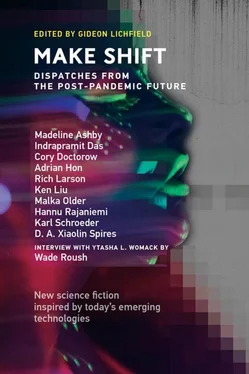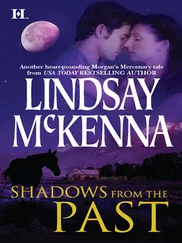They sat in awkward silence as she ate. Wilmar thought of watching A Kung-Fu Panda Christmas Carol with his brothers, thought of the Ghost of Christmas Past. After his glum days in Burbank, he’d felt like he’d found a better mood in SJC. But the darkness was creeping in around the edges again.
“These are wonderful,” she said and daintily dabbed at her lips with her dirty scarf.
“Where are you sleeping, Auntie?” Treesa’s voice was soft.
Her aunt got a suspicious look. “I’m fine, girl, don’t worry about me.”
“You can get an apartment here.” Now Treesa’s voice had gone hard. “You’re entitled to one. Everyone whose place was flooded out—”
Her aunt cut her off with a sharp gesture and suddenly she was much more present. “I have made it very clear that I do not want to live here. I want to live in my home. Our family home. Your great-grandfather—”
“Built a home that is now underwater , Auntie. I loved that house, too. But we’re not fish, Auntie.”
She made a sour face. “I don’t want to argue with you.”
A glum silence descended again. Treesa avoided Wilmar’s eye. He wondered if there was some graceful way to gtfo, but now that everyone else had distanced themselves, he’d be abandoning her. True, she was basically a stranger, but she’d come out for his Friendster call, so she was the kind of good person that he should be good to.
“I love you, Treesa. Best be on my way.”
He watched her struggle with herself. “Stay at my place, Auntie. I’ll take the sofa.”
He aunt didn’t even look back: “Told you I didn’t need charity.” She walked off, stooped and limping.
They didn’t say anything for too long. He decided he should say something.
“I’m sorry about your aunt, Treesa.”
A flash of anger, then sadness. “Me too.”
Should he go? Could he? He could fake a message from his couch-surf for the night and slink off. But Treesa really looked like she was hurting.
“You remember Uwayni’s first inauguration?”
“Sure,” he said. He’d been nine and everyone in the house had gathered around the biggest tablet to watch it, playing the audio on every speaker. His parents’ faces had shone and he’d caught some of their excitement. “For the first time in a century, we will raise—”
She picked up it: “A generation that is not afraid of the future.” She smiled. Such a sad smile. “Musta heard that a thousand times in school.” She pulled up a tuft of long, blue-green, drought-resistant grass, shook it like a pom-pom. “Our cheerleaders even had a cheer for it.”
“Well, it’s true,” Wilmar said. “Isn’t it?”
A silence so long that he wondered if she’d heard, then, “Yeah, it’s true. Talk to my dad, he still doesn’t believe it. Secretly he thinks we’re all doomed, the planets’ gonna roast and drown. And the generation before him—”
“Your aunt’s generation.”
“Them. For them, it’s like they’re refugees. We think we’re building the promised land, they see it as a camp.” She flopped on her back on the blanket and threw the clump of grass away. “Sometimes, I’ll come around a corner here and there’ll be a whole new building, a whole neighborhood even, and it doesn’t matter how many times I do the city plan flythrough and how many AR walkthroughs I take, it always takes my breath away. For me, this isn’t a refugee camp, it’s salvation. Our city was drowning and we used our own hands and our own backs to move it a mile inland and 500 feet uphill. We even relocated the Mission, one brick at a time!”
Wilmar lay back too. “I watched that. We all did, in Mojave. The stream was amazing. So many cool things under the ground and in the walls. Those dirty drawings that nun did—”
She laughed “You know they bricked them back up in the wall when they put it back together?”
“No way.”
She waved her hands in the air over them, seeming to grab at the stars appearing overhead. “Scanned them first, of course, but yeah. Every weird thing, down to the tin can full of old bottlecaps we found under the vegetable beds.”
He laughed, and they got quiet again.
“I’m sorry about your aunt.”
“I’m sorry you had to see her. It’s hard.”
“Don’t be sorry for that.”
“I am, though. My family business. My problem.”
To his great surprise, Wilmar began to weep.
“Oh, shit, dude—” She was looming over him now, worried.
He armed tears off his cheeks and dug tears out of his ears and sat up. Why couldn’t he stop crying? This was so stupid. He found his own face mask in a side pocket of his backpack and wiped ferociously at his face.
What he wanted, more than anything, was to stop crying, but that was not possible, it seemed.
“Wilmar? What is it? Can you talk about it?”
He pushed his breathing, slowed it, wiped his eyes and nose. “I’m sorry.”
“You’ve got nothing to be sorry for and I forgive you anyways. Want to talk about it?”
“It’s just my shit,” he said. “Honestly, it’ll be OK.”
“I believe you. But also, if you want to talk—”
He did, but he didn’t want to burden this stranger. “It’s OK.”
She got in his face. This close, he could see that she had a little zit on one cheek, see her dimples, see the dot where she’d taken out an old nose piercing. “Wilmar, dude, if it’s OK, it’s OK. But everyone’s got some shit and everyone needs to talk about it from time to time. You don’t know me and I don’t know you and sometimes, that makes it easier. Just think about that before you bottle this all back up again.”
His breathing and tears were under control, but the clouds that had closed in on him that morning and kept him in bed were back again. He thought about Treesa’s great aunt, broken and alone, and wondered if that could be him in a few decades.
He thought about how she’d refused to even discuss the situation. He opened up.
“OK, the fact is that I live with depression. I mean, everyone does to some extent and it’s not always on top of me but sometimes it just comes for a visit and sits on my chest and won’t get up. It whispers in my ear, tells me things will be terrible, that I’m terrible, that I’m not doing any good.”
He drew a shuddering breath. “Something about that Uwayni speech always seems to bring it on.” What were the right words for this? He’d never said them. Could he find them now? “I am afraid. That’s it. I’m supposed to be unafraid of the future, the first fear-free generation in a century but I’m so scared all the time. I watch the panels come off my line and I think it’s crazy, there’s no way we’re going to relocate every coastal city in the country—”
“In the world,” she said.
“The world! No way. The storms are worse every year, the heat is crazy, none of the flowers bloom on time anymore, the bees are still dying—”
“Not as quickly.”
“Not as quickly. Fine. Maybe we can save the bees. But I just can’t make the math work in my head. There’s so much to do. And then they send me home because there’s clouds over the factory—”
“You can’t save the world from runaway CO2 by producing trillions of tons of CO2. You know that, Wilmar. The job feels too big for you because it is . It’s a team sport, dude. The best thing you can do for the planet is fix stuff. And when you can’t fix stuff, the best thing you can do is stop breaking stuff. Hanging out in a park is just about the most benign thing you can do for the planet. The sun’s out somewhere, and they’re doing the work for us. You can stand down.”
“I know you’re right. But I feel like such a, such a fraud. Like everyone else is all ‘we got this,’ and I’m all ‘holy shit, we’re all going to fucking roast’ and the only thing that keeps me going is working so hard I don’t have room to think about it. Soon as work stops…” He flapped his arm at the world, at himself.
Читать дальше












